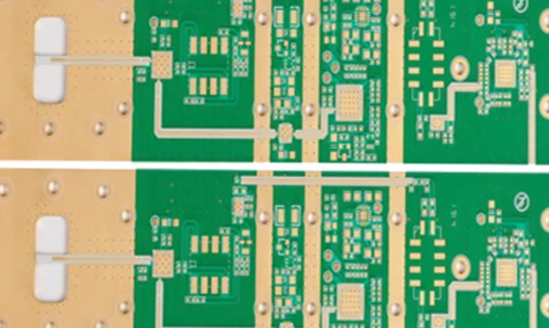 address:201, Factory 6, Longhui Industrial Park, Fuqiao 3rd District, Xinhe Community, Fuhai Street, Baoan District, Shenzhen china
address:201, Factory 6, Longhui Industrial Park, Fuqiao 3rd District, Xinhe Community, Fuhai Street, Baoan District, Shenzhen china
High-frequency boards for low-density designs can be single-layer PCBs
Even though it makes more sense to pack multiple circuits into a single board, some applications don't need complex circuitry. Simple devices like calculators have low-density circuit designs that require few electrical pathways, so a single-layer PCB is sufficient.
The circuit boards are also cheaper than the multi-layer type, so there is some incentive to use them in your project. With that in mind, here's all you need to know about single-layer boards.
What is a Single Layer PCB?

A Texas Instruments SR-56 Calculator PCB
Source: Wikimedia Commons
Also known as a single-sided board, a single-layer PCB features only a single conductive layer on one side of the board.
The other side hosts the electronic components, while a substrate layer forms the boundary between the conductive material and the elements. On the other hand, a protective solder mask and silkscreen layer cover the conductive side.
This is the simplest printed circuit board type compared to other designs and is best suited for simple low-density designs. Additionally, the PCB has no plated-through holes, and each line must have its path.
Types of Single Layer PCB
Single Layer Rigid PCB
Single Layer Flexible PCB

A flexible PCB
Source: Wikimedia Commons
Single Layer Rigid-Flex PCB
Single Layer High-Frequency PCB

A high-frequency circuit board
Single Layer Aluminum Backed PCB
1 Layer PCB Stack Up
Even though it is a single-layer circuit board, this PCB type has four layers in total. These include the following: silkscreen, solder mask, base, and conductive layers.

Single-sided PCB layers
However, the two main layers are the conductive and base layers.
Copper Layer
Also known as the copper layer, the task of the conductive layer is to transmit electrons and signals. As the name suggests, it usually consists of copper because it is the most affordable and feasible material. But silver and gold are also good conductors.
Base Layer (Substrate)
In addition to creating a platform for the other layers, the base layer holds the component assembly. FR-4 is the most commonly used material. But some PCBs have metal bases, and the material used can classify the circuit board.
Base Material for Single Layer PCBs
While FR-4 and metal are the most common, the other base materials for single-layer boards include Composite Epoxy Material (CEM), polyimide, and Teflon. Each has distinct features, characteristics, benefits, and drawbacks, suitable for different applications.
Single-Sided PCB Manufacturing Process
The process involves the following steps:
Order placement plus DFM check
Circuit board cleaning and cutting
PCB drilling and cleaning
Copper plating
Circuit printing
Etching
Automatic Optical Inspection
Solder mask application
Silkscreen application
Surface finishing
Flying probe test

Printed circuit board manufacturing
Advantages of Single-Sided PCB
Simple design
Easily available
Low cost
Easy to manufacture (short lead time)
Easy high volume production
Not easy to short the circuit
Easy to install
More reliable
Easy testing and repairing
Disadvantages of Single-Sided PCB
Wide size and weighty
Slow transmission speeds
Not ideal for complex circuits
Low operating capacity
Single-Sided PCB Applications
Single-sided PCB applications include the following:
Home appliances like coffee machines
Calculators, printers, radios (stereo equipment), mobile phones, and cameras
LED lights
Solid State Drives and sensors

A SATA SSD printed circuit board with electronic components
Source: Wikimedia Commons
Power supplies
Packaging equipment and vending machines
Relays
Surveillance equipment
Timer circuits
Deciding Whether You Need a Single-Layer or Multilayer PCB
The primary determining factor is the task requirements because the type of PCB should fit into your project. Therefore, you should ask yourself these questions:
What is the level of functionality for the project? If it is complex, go for the double-sided PCB or multi-layer board.
What is the maximum PCB size that can fit into your project? Multi-layer circuit boards pack several circuits in a small area, so they are the better option if you have limited space.
Is durability a key factor? If yes, pick the multi-layer PCB. Since it has multiple layers, it is thicker, making it stronger and more durable.
What is my budget? Single-sided circuit boards are easier to make, hence more affordable than multi-layer PCBs.
How fast do I need the PCB? Since single-sided printed circuit boards are easier to manufacture, they have a shorter lead time. Thus, you will get the board faster than a multi-layer board after ordering.
Multi-layer pcb layers
PCB Solutions: 1 Layer and Multilayer PCB Manufacturer
Since making PCBs is not an easy task, knowledge, skills, experience, and resources are vital factors that your PCB manufacturer should have.
At OurPCB, we have been manufacturing and assembling printed circuit boards since 2005. During this period, we have grown those factors and become the best PCB manufacturer.
Therefore, we can build you any single, double, or multi-layer printed circuit board that meets the highest quality standards.
Additionally, we only use authentic components sourced from reliable and well-known manufacturers to ensure the final assembly is of the best quality.
Contact us today by filling out a simple form and uploading your PCB design files. We'll get back to you and keep you in the loop throughout the manufacturing process.
-
No comment












 tel:+86-18825224069
tel:+86-18825224069 email:
email:





















